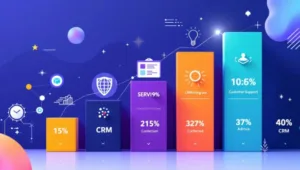Top 7 CRM for Services Business You Need in 2025
Are you looking for the optimal CRM for services for your service business? This guide highlights the top CRM tools that can help you manage customer interactions, streamline operations, and boost customer satisfaction.
Key Takeaways
- CRM systems are crucial for service businesses, providing a unified view of customer data to enhance relationships and operational efficiency.
- The top CRM tools for service businesses in 2025 include Bitrix24, Salesforce, HubSpot, Freshdesk, Zendesk, Zoho, and Creatio, each offering unique features tailored for service-oriented needs.
- Successful CRM implementation requires clear assessment of business needs, evaluation of key features, and ensuring integration capabilities to enhance customer interactions.
Understanding CRM for Service Businesses

Customer Relationship Management (CRM) stands for managing customer relationships and interactions through specialized customer relationship management software. For service businesses, CRM systems are indispensable as they offer a unified customer profile, enabling service professionals to elevate their service levels and deliver exceptional customer experiences.
The primary goal of a CRM system is to enhance customer relationships, which in turn drives business growth. In the service industry, a specialized CRM is essential for managing ongoing services and ensuring all customer service data is available in a single environment. This consolidated view allows service businesses to support their customers more effectively and efficiently.
Key Benefits of Using CRM in the Service Industry

Implementing a CRM system in the service industry offers numerous benefits:
- Creates a more customer-focused organization by consolidating historical data
- Enhances customer relationships and operational efficiency
- Increases customer engagement
These benefits are further explored in the following subsections, covering enhanced customer interaction management, streamlined customer data management, and improved customer satisfaction.
Enhanced Customer Interaction Management
CRM tools facilitate better teamwork by providing a shared record of customer interactions and contact management, allowing service representatives to track and streamline communication efforts. Service representatives can engage in more informed interactions by accessing comprehensive customer information such as history, past marketing offers, and previous purchases. This leads to seamless handoffs and personalized engagements that help strengthen customer relationships throughout the customer journey.
Moreover, modern CRM systems integrate AI to optimize customer experience across various functions, including marketing, sales, and customer service. AI agents can perform tasks such as responding to inquiries, scheduling follow-ups, and generating reports, thereby boosting productivity and enhancing overall customer service.
This leads to faster case management and improved customer satisfaction, making CRM systems an invaluable asset for service businesses. Additionally, crm improves customer service.
Streamlined Customer Data Management
CRM systems centralize customer data, making it easier for businesses to access essential information for decision-making. Benefits include:
- A unified view of customer data ensures consistent communication and easy collaboration.
- Preservation of vital contact details and notes.
- Enhanced team collaboration through shared profiles that improve service delivery.
Streamlining customer data helps CRM systems automate routine tasks and maintain high data quality, even when employees change roles. This centralization of all your customer data supports better customer service activities and ensures that all customer interactions are managed efficiently, creating a single source of truth.
Improved Customer Satisfaction
CRMs play a crucial role in maintaining customer loyalty by:
- Analyzing customer behavior and preferences to offer tailored support.
- Facilitating personalized support that fosters customer loyalty and enhances overall satisfaction.
- Utilizing AI capabilities to enhance decision-making with real-time insights.
- Improving productivity by predicting customer needs and optimizing marketing efforts.
Service businesses using CRM tools can respond to service requests and customer inquiries more quickly, thereby enhancing overall satisfaction. For instance, one service business utilizing Bitrix24 experienced a notable rise in customer satisfaction due to improved communication and project management features.
Similarly, companies using HubSpot CRM have seen significant increases in marketing efficiency and customer loyalty.
Top 7 CRM Tools for Service Businesses

In 2025, the best CRM software for service businesses combines essential functionalities with specialized tools. These CRMs effectively manage customer data and interactions while offering plenty of integration functionality and ease of use.
The following subsections provide an overview of the top seven CRM tools for service businesses, highlighting their key features and benefits.
Bitrix24
Bitrix24 offers comprehensive client management capabilities tailored for service-oriented businesses. Its robust features include project management, communication tools, and extensive integration options, making it a powerful and customizable CRM solution. Bitrix24’s advantages are particularly evident when compared to other platforms, as it combines a wide range of functionalities into a single, easy-to-use system.
Service businesses using Bitrix24 frequently report enhanced team collaboration and communication, resulting in better service delivery and higher customer satisfaction. The platform’s ability to manage customer interactions and streamline business processes makes it an ideal choice for service CRM needs.
Salesforce CRM
Salesforce CRM is a robust platform favored by large enterprises due to its extensive customization and integration features. The Sales Cloud provides essential capabilities such as lead, account, contact, and opportunity management, along with email integration. These features enable sales and marketing teams to manage customer relationships effectively and streamline their sales process using cloud based crm, ultimately generating more sales leads.
Salesforce’s comprehensive CRM tools facilitate the organization of customer data and interactions, making it easier for customer service teams to provide exceptional support. This level of functionality ensures that businesses can maintain strong customer relationships and enhance overall customer satisfaction.
HubSpot CRM
HubSpot CRM pioneers in digital marketing, offering robust reporting and supporting both inbound and outbound marketing. Designed for small to midsize service businesses, HubSpot CRM focuses on ease of use and strong marketing automation features. These tools enable businesses to effectively create marketing campaigns and improve customer engagement.
The CRM’s ability to streamline customer data and provide valuable insights helps marketing teams create targeted campaigns and track their effectiveness. HubSpot CRM’s user-friendly interface and comprehensive features make it an excellent choice for service businesses looking to enhance their marketing efforts and customer relationships.
Freshdesk by Freshworks
Freshdesk operates as an adaptive CRM system, adjusting to the evolving needs of service teams. It is designed to enhance service delivery through innovative tools, including AI-driven support that automates responses and streamlines customer interactions. This combination significantly enhances the overall customer service experience.
With its AI tools and adaptive functionalities, Freshdesk helps service businesses manage customer feedback and provide personalized service. This leads to better customer engagement and satisfaction, making Freshdesk a valuable tool for modern CRM systems.
Zendesk
Zendesk is designed to help service businesses effectively manage customer interactions. The platform assists businesses in managing customer tickets and inquiries efficiently, which is crucial for streamlining customer interactions and enhancing the overall customer service experience.
Zendesk’s focus on effective ticket management makes it an essential tool for service CRM needs.
Zoho CRM
Zoho CRM offers a free plan along with paid options starting at $20 per user per month, making it an ideal choice for growing service businesses. This affordability allows businesses to manage customer relationships without incurring high costs, ensuring they can focus on growth and operational efficiency.
Creatio CRM
Creatio CRM offers a no-code platform, allowing users to build and customize applications without needing technical expertise. This feature simplifies the customization of workflows, enabling businesses to automate complex processes efficiently. Creatio CRM helps consolidate all customer data, ensuring that service businesses have a unified view of their customer interactions on the CRM platform.
Designed specifically for customer service management, Creatio Service differentiates itself from sales and marketing solutions by focusing on post-sale customer interactions and support. This makes Creatio CRM a valuable tool for service businesses looking to enhance their customer service activities.
Comparing Service CRM vs. Sales CRM Systems
Sales CRMs primarily focus on the sales functionality and sales process, automating tasks like lead tracking and sales forecasting. In contrast, service CRMs emphasize post-sale customer interactions and support, helping businesses boost customer happiness and retention. Understanding these distinct functions and strengths can help service businesses improve customer satisfaction and operational efficiency.
A successful CRM implementation in service companies requires clear alignment between CRM functionalities and specific operational needs. Choosing the right type of CRM—whether it’s a service CRM or a sales CRM—allows businesses to better manage customer relationships and achieve their objectives.
How to Choose the Right CRM for Your Service Business
Choosing the right CRM for your service business involves assessing your business needs, evaluating key features, and considering integration capabilities. Each of these aspects is crucial to ensure the CRM system aligns with your operational goals and enhances customer interactions.
Assessing Business Needs
Selecting an effective CRM requires a clear understanding of the specific challenges and goals of your service business. This involves:
- Understanding your company’s unique requirements to find the ideal CRM solution.
- Identifying the current tools used for managing customer relationships.
- Recognizing gaps and areas for improvement.
- Establishing clear objectives for the CRM tool.
- Understanding the workflow of your business.
These are crucial steps in the process.
Customization of a CRM system should be guided by specific business workflows to ensure it meets unique operational needs. Some CRM providers impose additional charges for integrating third-party tools, which should be factored into the cost assessment.
Identifying the size of your current and potential customers base is also crucial in determining the appropriate CRM scale and features.
Evaluating Key Features
Effective CRM tools enable better management and tracking of customer interactions, fostering improved relationships. CRM systems facilitate collaboration among different teams by sharing customer information, allowing for quick access to a complete customer interaction history. This aids in providing timely support and improving the speed of issue resolution.
Advanced analytics capabilities, such as Zoho’s ai powered feature, provide predictive insights and data analysis for decision-making. Customization options in CRM systems, including creating custom fields and integrating with existing software, are essential to fit specific operational workflows.
Regularly gathering user feedback and examining system performance supports CRM evolution in alignment with changing business needs.
Considering Integration Capabilities
Ensuring a CRM integrates well with existing systems can significantly enhance operational efficiency. A CRM that supports third-party integrations allows for smoother data flow between various business applications, making it easier to manage customer interactions and streamline customer data.
Zoho CRM is recognized for its comprehensive integration with other Zoho applications, which exemplifies the importance of integration capabilities in a CRM system. By choosing a CRM with strong integration features, service businesses can enhance customer engagement and operational efficiency.
Implementing CRM in Service Companies

Implementing a CRM system in service companies involves several critical steps:
- Planning and customization
- Training and adoption
- Continuous improvement Each of these steps is essential to ensure the CRM system aligns with business objectives and enhances customer interactions.
The following subsections provide detailed guidance on each step.
Planning and Customization
A CRM system gathers, links, and analyzes crm data, which is crucial for managing customer interactions and improving customer satisfaction. Customizing a CRM is essential to align with specific business workflows and enhance operational efficiency. Creatio CRM’s built-in workflow automation tools allow users to automate complex service processes, facilitating the sharing of customer data across various departments and integrating effective crm solutions.
By tailoring the CRM system to match existing business workflows, service businesses can enhance team collaboration and communication, leading to better service delivery and higher customer satisfaction. This customization ensures the CRM supports personalized service and meets the unique needs of the business.
Training and Adoption
Comprehensive training enhances user comfort with the CRM system, improving adoption rates and maximizing overall benefits. Effective training programs are crucial for overcoming resistance to new systems, ensuring that all employees understand how to utilize the CRM to its full potential. Including practical exercises and diverse learning formats in the training program can greatly increase CRM adoption rates among staff.
Customizing a CRM system to match existing business workflows can significantly enhance user adoption and minimize disruptions during the transition. Aligning the CRM with daily operations makes it easier for employees to integrate the new system into their routines, leading to better customer engagement and service delivery.
Continuous Improvement
Regular evaluation of the CRM system is essential to adapt to business changes and ensure it meets evolving operational needs. Continuous improvement is vital for adapting CRM systems to business needs, allowing businesses to refine processes and enhance customer relations continually.
Ongoing evaluation of CRM systems allows businesses to refine processes and enhance customer satisfaction. Regularly assessing the CRM’s performance and gathering customer feedback ensures the system continues to meet customer expectations and support business growth.
Success Stories: Service Businesses Thriving with CRM

Organizations that have effectively implemented CRM systems have seen higher customer engagement and improved overall revenue. Service businesses have reported significant improvements in customer engagement and operational workflows after implementing CRM systems.
The following case studies highlight the success stories of service businesses using Bitrix24 and HubSpot CRM.
Case Study: Bitrix24
Bitrix24 is a comprehensive CRM solution that provides client management capabilities and extensive integration options tailored for service businesses. By utilizing Bitrix24, a service business was able to enhance customer interaction management, leading to significantly improved customer satisfaction levels. The implementation of Bitrix24 streamlined business processes and facilitated better data management, resulting in heightened operational efficiency.
Businesses using Bitrix24 have experienced an increase in team collaboration and project transparency, resulting in quicker decision-making. The platform’s extensive features and integration options have made it a popular choice among service-oriented companies looking to enhance their project management and client relationship strategies.
Case Study: HubSpot CRM
A service company leveraged HubSpot CRM features to enhance its marketing strategies and improve customer retention rates. The use of HubSpot CRM allowed the service company to create more personalized marketing campaigns, leading to a marked increase in customer retention rates. Overall, HubSpot CRM effectively contributed to enhanced marketing efforts and customer retention for the service company.
Companies employing HubSpot CRM have notably improved their analytics capabilities, allowing for better tracking of marketing campaign effectiveness. The integration capabilities of HubSpot CRM enable businesses to connect with a variety of marketing tools, enhancing overall functionality and customer engagement.
Summary
In 2025, CRM systems are indispensable for service businesses aiming to improve customer relationships and operational efficiency. From enhancing customer interactions to streamlining data management and boosting customer satisfaction, the right CRM can transform your service business. By choosing the right CRM, planning its implementation carefully, and continuously improving the system, service businesses can achieve exceptional customer experiences and drive business growth.
Frequently Asked Questions
What are the key benefits of using CRM in the service industry?
Utilizing CRM in the service industry significantly enhances customer interaction management and streamlines data handling, leading to improved customer satisfaction through personalized support and quicker responses. Adopting CRM is essential for fostering stronger client relationships and driving service excellence.
How does Bitrix24 help service businesses?
Bitrix24 helps service businesses by providing comprehensive client management tools and integration options that enhance team collaboration and communication, ultimately leading to improved service delivery and increased customer satisfaction.
What makes HubSpot CRM suitable for small to midsize businesses?
HubSpot CRM’s user-friendly interface and robust marketing automation capabilities make it ideal for small to midsize businesses, allowing them to efficiently manage campaigns and enhance customer engagement. This combination supports their growth and operational efficiency.
How do service CRMs differ from sales CRMs?
Service CRMs emphasize customer support and retention after a sale, whereas sales CRMs are geared towards managing sales processes and tracking leads. Understanding these differences can help businesses choose the right CRM for their specific needs.
What should businesses consider when choosing a CRM system?
When choosing a CRM system, businesses must assess their specific needs, key features, and integration capabilities to ensure alignment with operational goals and improved customer interactions. Prioritizing these aspects is crucial for effective CRM implementation.

